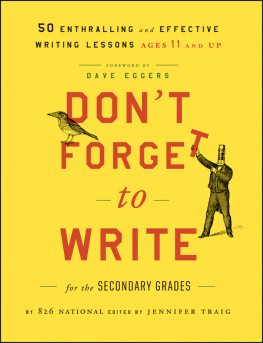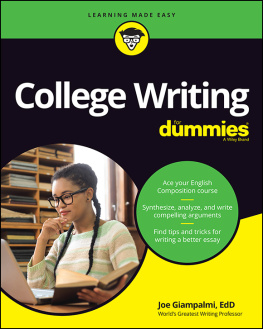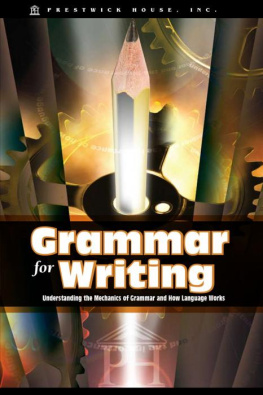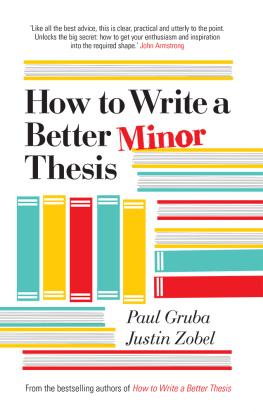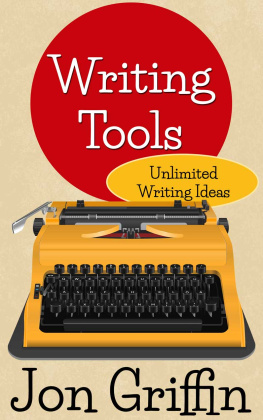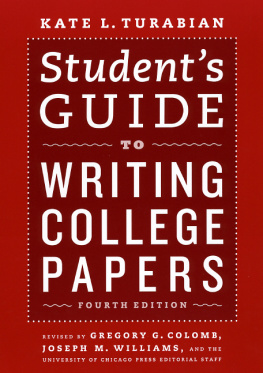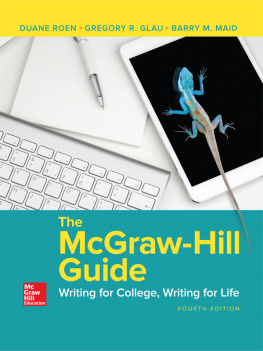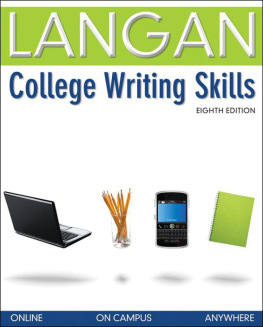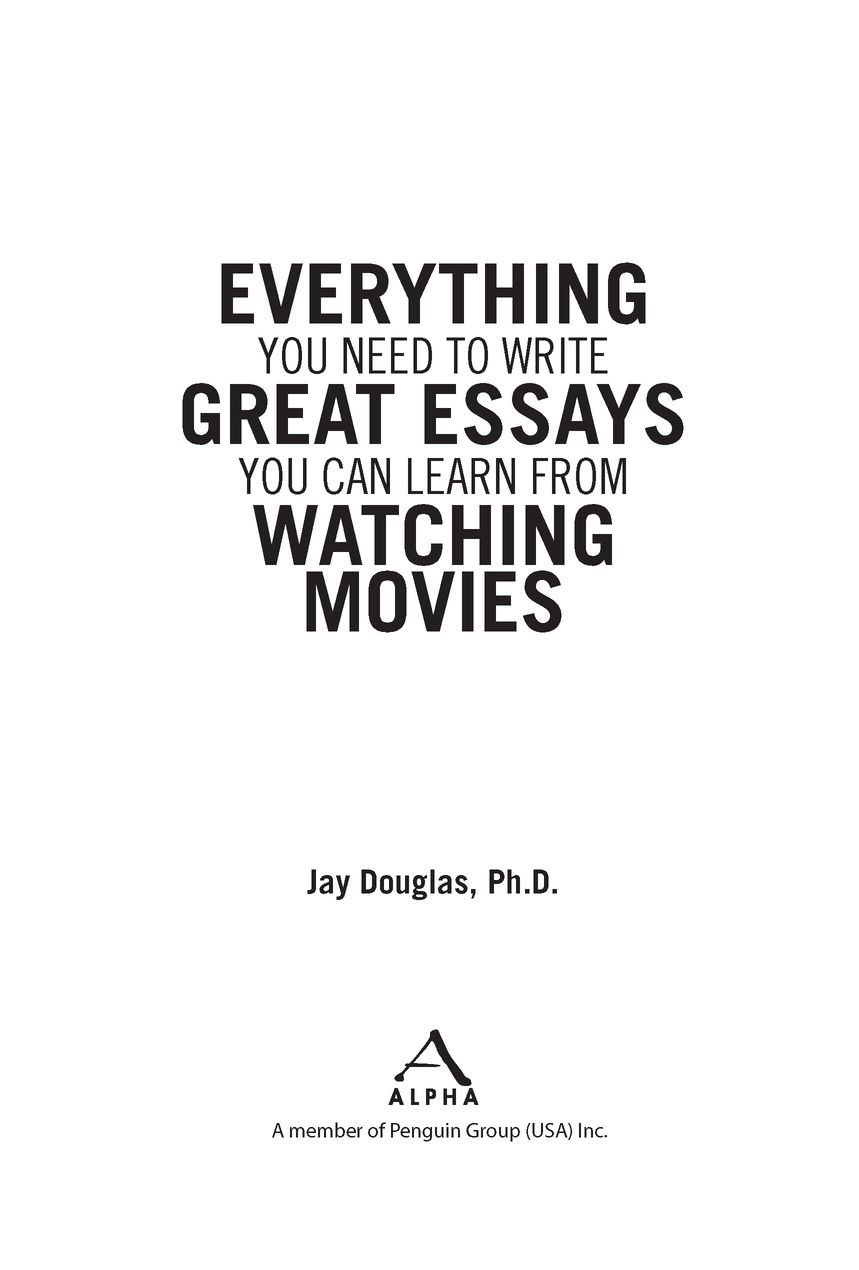Table of Contents
To Penny
(with a tip of the hat to Claudia, who insulted my writing
when I was fifteen and inspired me to prove her wrong)
Introduction
According to independent research studies by both the College Board and the University of California, a students writing skillsnot math, reading, or SAT scoresare the single best predictor of success in the first year of college. Dont be surprised. Consider the qualities good writers share: creativity, effective communication, research, critical thinking, persistence, and attention to detail. What teacher, professor, or employer wouldnt find value in someone who is competent in all those areas?
Yet when most students compile their lists of favorite activities, writing weighs in somewhere south of a tonsillectomy performed by their Great-Aunt Edna. If youre in that category, there are five things you need to know:
You are not alone.
Its not your fault.
Your situation is not hopeless.
Every time you watch a movie, you are learning to write better.
No, Im not kidding about that last point.
To understand completely, youll have to read this bookpreferably after you buy itbut heres the general idea. The process behind writing an essay, term paper, Ph.D. dissertation, short story, newspaper article, or novel is about the same as the process of making a Hollywood movie. Both writing and filmmaking require preparation time, production time, and finishing-up time. Hollywood calls these three phases pre-production, production, and post-production, respectively.
In filmmaking, these three phases can span a period of years. The most visible part, the glamorous part, is the production phase, with the sets, the crew, the equipment, and the stars. Yet shooting the film consumes only a few weeks out of the filmmaking process. Ask Steven Spielberg, Kathyrn Bigelow, or James Cameron what they are doing during the rest of the time and theyll undoubtedly reply, Im making a movie. Filmmakers understand that they dont have to be capturing images on film to be involved in the filmmaking process.
As a writer, focusing solely on putting words on paper is a bit like a filmmaker focusing solely on filming and not bothering to secure the right props or have the sets built or hire all the actors or add music and sound effects to the finished product. Both filmmaker and writer will be unprepared and disorganized. Theyll lose sight of the big picture (no pun intended) as they fiddle with the details. In the end, both will feel tired, angry, frustrated, and stressed out. If youre that filmmaker, youll be looking for a new line of work. If youre that writer, youll hate what youre writing. Youll hate your teachers, your parents, your friends, and anyone connected with what youre writing. If youre writing about a person, youll hate him or her, too. Focusing solely on the words-on-paper part is whats made you rail against writing your entire life.
Where did this focus on words come from? As a writer and teacher it hurts me to say this, but you acquired that bad habit in school. It wasnt intentional. Nobody conspired to keep you out of college or cripple your career. Emphasizing the words over the process is an unfortunate side effect of our education system.
While schools teach the mechanics of writing, they rarely address issues such as getting unstuck, writing a first draft, brainstorming, finding where your thesis is hiding, soliciting useful feedback, or telling a story in pictures. Schools dont teach any of that because our education system is geared to teach the parts of writing that can be measured, graded, analyzed, and acted upon.
The part thats missing, the part you dont learn in school, concerns the process of writing. Teaching a process is time intensive. In an era when budget constraints force teachers to deal with more students, shorter classes, and bulging course content, its not that educators dont know how to teach the writing process, nor that they dont care whether you learn it; educators simply dont have the resources to devote to this critical side of writing. Through no fault of your own, youve learned that writing is all about getting the words down correctly. This is a bit like learning that gourmet cooking is all about arranging food on a plate. To move past the words-on-paper part, you need to discover your personal writing process.
This book can help.
Once you understand how you write, when you write, where you write, and how you work best, you will find your writing experience is more fun, more expressive, and less stressful. Writing may never be your most favorite activity in the whole world, but it will no longer feel like a punishment, an act of self-humiliation, or a skill that perpetually dances out of reach. As you relax into your writing process, youll see improvements in many areas. Youll have more creative ideas, youll think before you write, and youll pay more attention to details. Youll polish your assignments instead of dashing them off the night before theyre due. Youll develop these all-important traits not because they are ends in themselves, but because you need them to express what you want to say.
Even if you dont read inside stories about your favorite films online or watch behind-the-scenes bonus material on DVDs, you know more than you think about how films are made and what makes them work. Using that knowledge to improve writing skills is an approach I developed in my 15-plus years of teaching essay writing workshops and college classes. Many of the tips, techniques, and a-ha moments of those years are collected in this book, including advice from students and Hollywood filmmakers on applying the principles of Hollywood filmmaking to transform your writing. Read this book, and every time you watch a movie youll be learning to write more effectively. You might even find your enjoyment of movies increasing, too.
Anyone can learn to write better. You may never be another Toni Morrison or Stephen King. That takes talent, dedication, practice, and more than a little luck. But you can improve how you write and what you write, no matter what your present skill level. If you have the desire, this book, and a few hours a week spent watching movies, can improve both your writing skills and your opportunity for success in school and beyond.
J. D.
Los Angeles
January 2011
How to Use This Book
Think blog posts. Thats the way this book is constructed. Each section contains 15 to 20 short entries you might find on a blog instead of in a book. The advantage of a book, though, is now you have something portable, always at the ready; its something you dont need a WiFi connection or a good 3G signal to read. And, yes, there is something almost respectful in displaying writing about writing in a format larger than a blazer patch.
At the same time, my writing in blog posts instead of long, drawnout chapters means you get what you want in a style that fits your multitasking worldquick downloads of important information that leave the decision whether to pursue a topic further in your hands, not some absent authors. As such, most of the posts in this book stand by themselves. Use them to solve a specific problem, satisfy your curiosity about a particular topic, or jog your ideagenerating faculties. As you read, keep in mind the premise of this book: writing is more than putting words on paper. Writing is a personal process that you can understand and develop in part by watching movies.



